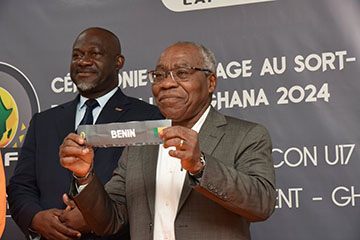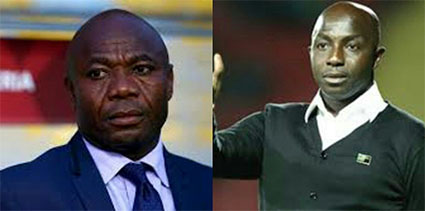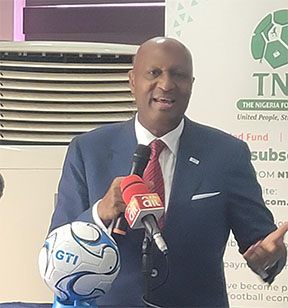Nigerian Football
Eye Witness Account with PHOTOS: How Okwaraji, Five Fans Died
BY KUNLE SOLAJA.
The August 12, 1989 Italia ’90 World Cup qualifying match with Angola could had just been another match day. But it is now ever recalled, not for the result, which was favourable to Nigeria at least in the short run, but for the bizarre happenings.
It was just a day to the 10th anniversary of a previous disaster that claimed 24 lives at the National Stadium, Lagos.
Nigeria desperately needed to win the tie against Angola to be in contention of leading a World Cup qualifying group that also had Gabon and Cameroon.
The result of the penultimate match in Gabon which Nigeria against formbooks had lost 1-2 made the August 12, 1989 match the more important.

- Hon. Nduka Irabor and some members of the Nigerian Football Supporters’ Club helping the fainted fans into an ambulance.
Besides, it was to be the first match after a long closure of the National Stadium, Lagos which was undergoing upgrading for an anticipated hosting of the then World Youth Championship (now u-20 World Cup) in 1991.
Nigeria had had to play their home matches at the low-capacity Lekan Salami Stadium, Ibadan until the National Stadium, Lagos was reopened.
Expectedly, the stadium was jam-packed for a teeming crowd that appeared to have been starved for close to two years that the stadium had been closed for refurbishment.
The crowd thronged the 40,000 capacity stadium, filling it nearly 20,000 over. About 4,000 others were stranded outside, making rounds to the 12 ramps leading into the main- bowl.
Announcements blared from the public address system directing the crowd outside to gates D, E and F leading to the southern pavilion at the Lagos end of the field. Gates had been opened nearly seven hours to kick off.
The spectators’ stands were overfilled, resulting in jostling and pushing, chokes, suffocation, exhaustion and soon, deaths! Moments before kick-off, some of the spectators around the covered terraces began to faint in ones and twos.

- Efforts to revive the fans yielded no result

- One after the other, they died
Few people might have noticed the unusual incident of an ambulance moving on the just refurbished tartan tracks to convey the fainted fans after efforts at reviving them by medical personnel had failed.
Then another ambulance came again. Ambulance movements became a common sight. The stadium’s clinic with only three beds became jam-packed with unconscious people.
Medical personnel said there were so many of them and they had to be treated on the bare floor. Fifteen of them had to be taken to the General Hospital in Lagos.

- Journey to the morgue begins
One Mutiu Salami, a 14-year old victim who was rushed to the General Hospital and regained consciousness three days later narrated his experience: “As the match drew to an end, everybody was rushing. They rushed me and I fell down. The next thing I knew was finding myself at the hospital”.
He was lucky. It was more disastrous for others. Five of them died. Niyi Mosuro, a 15- year-old schoolboy from Ijebu-Ode was one of the victims identified. August 12, 1989, was the first time he would watch a football match at the National Stadium.
It was the last day he lived. Wale Mosuro, his uncle, said Niyi was not quite a football enthusiast. His body was discovered in the morgue. Others identified were bodies of Shehu Tijani and Okorie Agwu.
Everything went awry that sunny August 12, 1989. Sad incidents that would catch worldwide attention were unfolding. From the sidelines, five football fans were suffocated to death. Football, a national passion, overnight turned a national horror.
The standard of soccer in the Nigeria-Angola match fell below expectation even though both teams paraded a pack of tested professionals. Tackling was rough. Each side lost a penalty kick. Austin Eguavoen lost that of Nigeria.

- A caution from the referee, which in a twist of fate was a ‘red card’ from life. This is the last known photograph of Okwaraji alive. His first match at the Lagos National Stadium turned the last time he played and lived.
But the biggest disaster of the day was imminent. As the drab match progressed, an Angolan player slumped.
Medical personnel rushed to administer treatment. It was barely 10 minutes to the end of the match. As attention focussed on the injured player, and while some fans that had fainted by the sidelines were being attended to, the unexpected happened.
Dreadlocks haired Samuel Okwaraji, the Nigerian bubbling mid-field maestro, collapsed and fell face down. Few people would have thought it was mere exhaustion.
“We all thought he merely fainted and that he was going to recover,” Etim Esin, a teammate, remarked the following day at the then Durbar Hotel (now Golden Tulip, Festac Town) abode of the team.

- The moment Okwaraji slumped…
The nearest player to Samuel Okwaraji, Samson Siasia, rushed to the prostrate form and tried him to face up. What he saw was frightening as he put his hands on his head in despair.
“The way I saw him, he was gasping and foaming. His teeth were gritty… No one could easily ascertain the cause of his death. It still remains a mystery.
But one of the doctors that first attended to him told this reported that Samuel Okwaraji died “very fast”. He may have died on the pitch.
Nigerian Football
Nigeria face tough defence as Burkina Faso lie in wait at U17 WAFU B AFCON qualifiers

Defending champions Nigeria have been handed a difficult path to the 2025 U17 Africa Cup of Nations finals after being drawn in the same group as Burkina Faso for next month’s WAFU B qualifying tournament in Ghana.
The Golden Eaglets, who won the last edition of the regional championship in 2022, will also face Togo and Niger in Group B of the competition which runs from 15-28 May.
Hosts Ghana find themselves in Group A alongside Cote d’Ivoire and Benin in a tough-looking section of the competition to be played in Accra.
The draw was conducted by 1970s Ivorian football legends Kobenan Kouman and Die Foneye at the Ivorian FA headquarters in Abidjan on Friday.
Nigeria claimed their WAFU B U17 AFCON title by defeating Burkina Faso 2-1 in the regional final in Ghana two years ago.
However, they will need to overcome some familiar foes if they are to defend their crown and with the Burkina Faso finishing third at the last TotalEnergies U17 Africa Cup of Nations, some exciting matches are expected.
Arch-rivals Nigeria and Ghana are among the two favourites and could meet in the final in Accra on 28 May, should they top their respective groups and make it through the semi-finals.
Ghana also have pedigree at this level, having the World Cup in 1991 and 1995 as they bid to reach the U17 AFCON finals on home soil.
The top two teams from the WAFU B tournament will qualify for next year’s U17 Africa Cup of Nations.
Groups:
Group A: Ghana, Cote d’Ivoire, Benin
Group B: Burkina Faso, Nigeria, Togo, Niger.
Nigerian Football
Former Nigeria international, Onye recommends Amuneke-Siasia combo for Super Eagles

BY KUNLE SOLAJA.
Kingsley Onye, the left sided defender who was a member of the first Flying Eagles side to have a podium finish at the U-20 World Cup has suggested the employment of Emmanuel Amuneke as the coach of the Super Eagles.
He wants him to be assisted by Samson Siasia when the ban on the latter lapses in August. Alternatively, Onye pointed to Sylvanus Okpala as alternative to Siasia.
The Super Eagles are in dare need for a head coach as the clock ticks down to the Match day 4 and 5 of the 2026 World Cup qualifiers in which the team is trailing at the third position.
The two matches in early June are crucial for the Super Eagles to bounce back into reckoning as the team can not afford to drop any of the available six points in the duels with South Africa at home and away to Benin.
From this Monday, it is 41 days to the potentially challenging tie with South Africa, but the Nigerian national team has been without a coach since the expiration of the contract of Portugal’s Jose Peseiro shortly after the Africa Cup of Nations in Cote d’Ivoire.
Without mincing words, Onye remarked: “Emmanuel Amuneke is the right man for the job of the coach of Super Eagles. He has been there before.
“He tasted it and had been fantastic with the Nigeria youth team, the U-17 by assisting Manu Garba to win the U17 World Cup in 2013 and as head coach, led the Golden Eaglets to win the cup again in 2015.”
Onye who played for the Enugu Rangers in Nigeria before venturing to the UK but had his career scuppered by freak injury pointed out that the solution to Super Eagles’ technical deficiency is the appointment of an indigenous coach and that Amuneke is the man.
In buttressing his assertion, he declared: “As a senior team coach, Amuneke qualified a long standing absentee team, Tanzania for the 2019 Africa Cup of Nations.
“His record as a player is also very impressive. He played and won with the Super Eagles, the AFCON 1994. He played at the Olympic Games and was also the first Nigerian to score two goals at the World Cup.
“He has played at the African Games and also for top clubs in the continent as he was a member of the Egyptian giants, Zamalek. In Europe, he played for Sporting Clube de Portugal and then Barcelona before injury ended his playing career.”
Onye also looked at the personality of Amuneke in recommending him for the Super Eagles job.
His record as a player is also very impressive. He played and won with the Super Eagles, the AFCON 1994. He played at the Olympic Games and was also the first Nigerian to score two goals at the World Cup.
He has played at the African Games and also for top clubs in the continent as he was a member of the Egyptian giants, Zamalek. In Europe, he played for Sporting Clube de Portugal and then Barcelona before injury ended his playing career.
Nigerian Football
GTI enlarges coast…spreads from League fund-raising to Federation Cup

BY KUNLE SOLAJA.
Strategic partners of the Nigeria Football Federation, GTI Asset Management and Trust Ltd has expanded their scope of operations from fund sourcing for the Nigeria Premier League to adding the responsibility of getting the national cup competition back into its glamorous days.
The MD of the company, Abubakar Lawal at the unveiling a revamped Federation Cup which has been renamed President Federation Cup remarked that his company decided to take a bold step to support the national cup.
“I am the happiest man today, he said in the opening remark of the rebranding of the national cup through signing of Memorandum of Understanding with the Ministry of Sports and the NFF.
“Our company is also strategically involved in ensuring that the President Federation Cup is given necessary attention to thrive using The Nigeria Football Fund (TNFF) as our vehicle to actualise this dream.
“Therefore, it is our vision that the oldest domestic football event becomes one of the best organised football events in the world in no distant future.”
-

 Nigerian Football1 week ago
Nigerian Football1 week agoRemo Stars add fuel to the fire as title chase turns East – West battle
-

 UEFA Champions League1 week ago
UEFA Champions League1 week agoNigerians among Leverkusen’s African quintetin historic Bundesliga triumph
-

 Nigerian Football1 week ago
Nigerian Football1 week agoRangers tenaciously hold on at Nigeria League top position
-

 CAF Confederation Cup22 hours ago
CAF Confederation Cup22 hours agoNigeria’s Samson Adamu signs Algeria’s USM match forfeiture
-

 OBITUARY1 week ago
OBITUARY1 week agoAnother Germany World Cup winner dies
-

 Nigerian Football1 week ago
Nigerian Football1 week agoHeartland back to their homeland as they host Shooting Stars
-

 FEDERATION CUP6 days ago
FEDERATION CUP6 days agoBREAKING! Federation Cup acquires presidential nomenclature…7th name since inception
-

 CAF Confederation Cup6 days ago
CAF Confederation Cup6 days agoConfederation Cup runs into crisis as Moroccan players of RS Berkane are stranded at Algerian airport following seizure of jerseys and equipment




